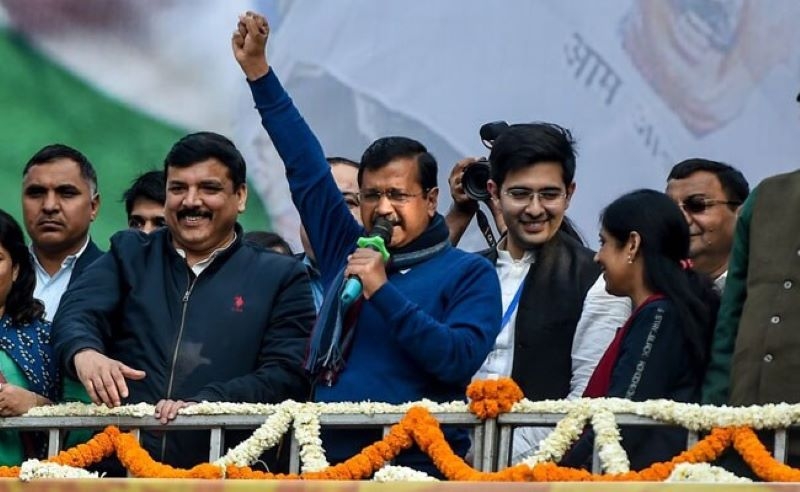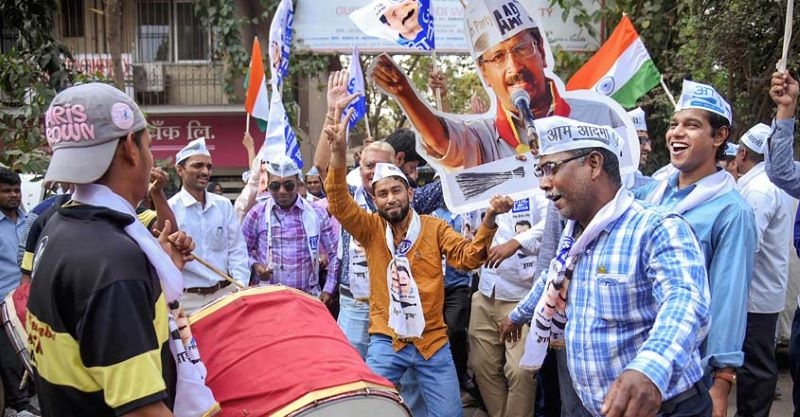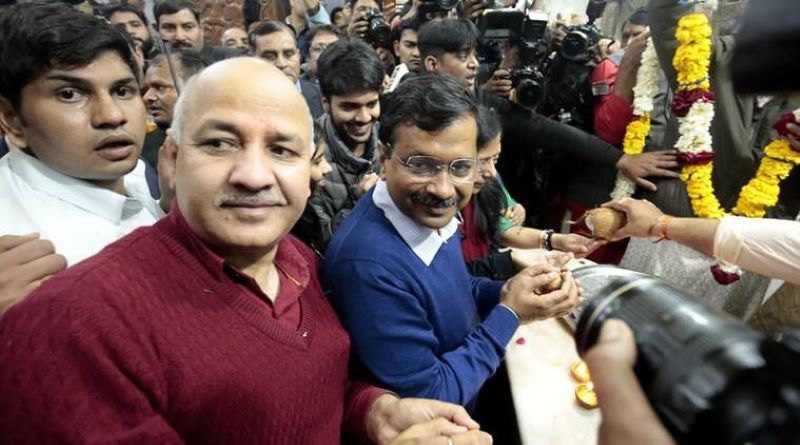Lessons of Delhi State Assembly Elections

As per Exit polls prediction, the Aam Admi Party (AAP) has won a resounding electoral victory; total drubbing for the Congress Party; and what with the Bharatiya Janata Party (BJP) scrapping with single-digit seats.
There are lessons to be learned from the final outcome of the Delhi State Assembly Elections.
One, AAP won based on populist measures effectively implemented during its rule. BJP attempts to polarize politics on “We vs They” woven around Hindutva, failed to pay electoral dividends.
Two, Muslim polarization is complete and total. Howsoever, Modi and the BJP may attempt to appease the Muslims through initiatives like “Triple Talaq” to promote gender-based divide, they cannot succeed. If any, Muslim women are at the forefront of protests not only in Shaheen Bagh but also elsewhere in cities like Mumbai. Sooner Modi and the BJP realize the futility of attempts to win over the Muslims, the better it is for the party’s prospects.
Three, Hindus-Sikhs-Jains-Buddhists polarization remains a Himalayan challenge. They continue to be divided vertically and horizontally on caste and communal lines.
Four, pseudo-secular party like the Congress Party has been shown the exit door from Indian politics. The poll percentage clearly reflects the irrelevance of the “Dynasty”. Neither Rahul Gandhi nor Priyanka Gandhi can inspire their followers and sympathizers to rally. Gone are the days of winning elections in the name of “Dynasty” or the “Congress Party’s Hath”. Earlier their cronies/sycophants abandon and opt for greener pastures the better it is for them to remain politically relevant.
Five, AAPs leaders and its supporting spokespersons believe that welfare measures -Freebies - like free travel for women in Metros, Buses, electricity, water, etc., enabled AAPs victory.
Six, few other analysts believe that it is the “Save Democracy” protests that have played a key role in the outcome of elections.
In sum, “freebies” and polarization of Muslims – Shaheen Bagh protests against the CAA, NRC, and NPR - ensured AAPs clean sweep.
One thing is, however, certain. Indian political scenario is extraordinarily uncertain. The decibel levels of ongoing disruptive or self-destructive political narrative or discourse in the paid partisan media channels will become shriller with utter disregard to polarization on communal lines. If continued, the social divide may further consolidate and polarize society. If so, chances of national unity will further recede.

Arvind Kejriwal and AAP cannot easily succeed in replicating the “Freebies” given to women and also domestic power consumers in Delhi, on All-India basis due to financial constraints. Within Delhi NCR region, AAP cannot replicate the “Amma or Anna Canteens” (Rs.1 for an idly, Rs.5 for a plate of sambar rice, Rs.5 for a plate of "Karuvapellai Satham" (Curry leaves rice) and Rs.3 for a plate of curd rice Rs.5/-) per lunch for poor and middle class in all Mohallas. Its sole “Aam Admi Canteen” at LNJP Hospital is pegged at Rs.10/- per meal even now. Its past announcement of operating 100 such canteens in Delhi still remains only on paper.
Add to it, “Can Kejriwal extend “freebies” on All India basis to include: reduction in electricity bills up to 400 units; and, 20 kiloliters of free water per month for homes with metered connections and to pay 10% more if they exceed that limit?”
After all, populism has its limits. Delhi’s “Revenue Surplus” facilitated the implementation of populist initiatives. Let none suffer from illusions that the same “freebies” can be replicated on all India level considering the “Financial health” at the central and state levels. Even in Delhi, sooner than later, there will be demand for waivers of student fees and bank loans. So also, even male students may demand free bus rides in cities. And, “freebies” cannot be stretched at the cost of development and growth.
Following AAP’s return to power, his Muslim supporters are bound to up the ante over providing 5 percent reservation of jobs in Delhi State government jobs and also quotas in education, which is their long-standing demand.
Can Kejriwal and the AAP create government jobs to absorb the unemployed youth roaming on the streets of Delhi? All Kejriwal, as the Chief Minister of the State, would do is to indulge in blame games against Modi led BJP for failure to create jobs even in Delhi State thereby obfuscate the real issue.
In sum, it is vital to recognize that issues/problems at the national level are far more vexatious to manage than the ones in the Delhi NCR region.

None of the past Prime Ministers can lay claims to successful political leadership status considering the present distress status of the economy and socio-political divide. Each one has cumulatively created the build-up to the present mess in almost all fields.
And, there is none appearing on the horizon to set the course of the nation on an even keel based on a well-defined vision and end objectives. All alike have failed dismally to manage extraordinarily complex social dynamics of India’s pluralist society - suffered from the psychology of political leadership incompetence.
Be that as it may, let me review in outline Arvind Kejriwal's leadership and statesmanship capabilities. An IIT graduate and IRS officer-cum-agitator turned political leader and self-styled Anarchist, who is by all past stories until now is an “Authoritarian” leader. He brooks no opposition to his views.
Since Arvind Kejriwal is still young (51 years only) compared to the “Old leaders” in other rival parties, time is on his side. How he adapts to the highly complex and fluid political dynamics on the ‘roll’ in a pluralist society with bewildering and nerve-racking challenges, time alone can provide answers.
Based on his past academic credentials, Arvind Kejriwal has demonstrated ample creativity, improvisation, inventiveness to appeal to the people on the streets of Delhi and confront his political rivals. He is not averse to risk-taking which is vital to overcome high-risk and rapidly altering political scenarios. And, he has suffered setbacks in the Delhi-backyard States like Haryana and Punjab.
However, the number of founding leaders of Aam Admi Party who resigned or expelled due to personality clashes include Prashant Bhusan, Yogendra Yadav, Ashutosh, Ashish Khaitan, Kapil Mishra, Mayank Gandhi, Kumar Vishwas, Anjali Damania, Ajit Jha, G R Gopinath, Shazia Imli, Alka Lamba, Ashok Agarwal, MS Dhir, S P Udayakumar, Ashwini Upadhyay, Surajit Dasgupta, Nutan Thakur, and Maulana Maqsood Ali Kazmi. and so on.
Leadership is about culture; not just character. In a democracy, the culture of team building, spirit, and cohesiveness in an atmosphere of reconciliation and consensus not only within the AAP but also with political rivals is imperative. The art and science of political survival is not easy to master.
As per media reports, Arvind Kejriwal has not spelled out AAPs ideology other than claiming to be “Anarchist”. Authoritarian anarchism can plunge the nation into utter chaos.
Will Kejriwal concede political space to the “Dynasty” - Rahul or Priyanka Gandhi – or Mamata Banerjee or Uddhav Thackeray in his new incarnation, and KCR among many others in the race for PMs job post-Modi and BJP rule?
The challenges of political leadership, and also statesmanship - seeing things clearly, creating a strategy, sharing a vision, and encouraging action throughout an organization are all hallmarks of strong leadership. Arvind Kejriwal’s Statesmanship, as at the present stage, is yet to be proven at national, regional and international levels.
Can Arvind Kejriwal take on headlong the challenge of demographic transitions – mother of all strategic challenges and key to others - that are going on with no end in sight to engulf India at the cost of losing Muslim minority vote banks?
In sum, perception and reality are tempered by a leader’s unique personal needs, biological and emotional impulses. But, ‘pragmatism’ is imperative to shape leadership behavior in pursuit of safeguarding national security interests.
It implies that for political leadership to succeed in modern Indian political scenario, a very superior level of intellectual clarity of perception and a response which is commensurate with the end objectives of political action appropriate to the reality of the circumstances and achievable with the resources - financial, material and human - is vital.
Even if one possesses such capability, he or she will be dragged down the hill by those entrenched deeply in the system for status quo ante best suits them.
To top it all, external enemies, particularly Pakistan, is hell-bent upon “Balkanization” of India. China too would support such a move of “Balkanization” of India for it suits their national interests. Add to them, the Christian West consolidation in the Hill States of the Northeast. Also, its continuing forays among the Dalits in South Indian states. Recently, Goa’s Archbishop, Rev Filipe Neri Ferrao, has unequivocally declared his opposition to the CAA-NRC-NPA and even drubbed Modi’s initiative as divisive, discriminatory and anti-democratic.
So, how long the fundamentalist Hindu elements will tolerate heinous threats bent upon destroying Hindu civilization depends on its leadership. Inevitable and imperative for the polarization of Hindu’s in the face cumulatively ascending Muslim onslaught in pursuit of “Islamic Caliphate”.
Of course, Modi led BJP has been given a drubbing by the Hindu majority. Arrogance cannot pay in democracy; but austerity pays, which appears to be anathema to Modi and the BJP. Leaders must lead by example of austerity. Foreign visits must become bare minimum considered vital.
Modi must take a cue from Uddhav Thackeray stinging comment: “Desh Jan ki Baat Se Chalega; and Man ki Baat se Nahin.”
And, if they fail to draw lessons from the defeat by the people of Delhi and learn from them, people are unlikely to repose their faith in 2024. Recognize earliest they must that people cannot be expected to blindly repose confidence all over again based on the high-fly announcement of developments or jingoistic rhetoric against adversaries or external visits.
By banking on the inauguration of Ram Mandir prior to 2024 elections are unlikely to sway the emotions and sentiments and rally the Hindus to vote for the BJP.
People want delivery of affordable. People detest extravaganza at their costs like flaunting power with gunmen and large escort convoys accompanying them.
In reality, India is a diseased civilization full of contradictions and at war from within. Following Islamic radicals rallying their forces, posterity appears bleak from the national security point of view.


